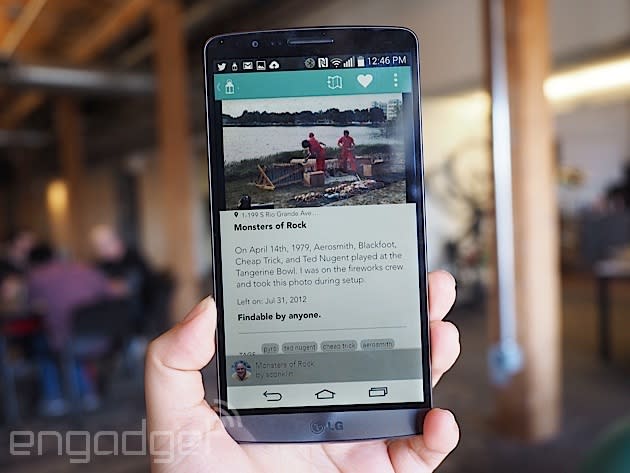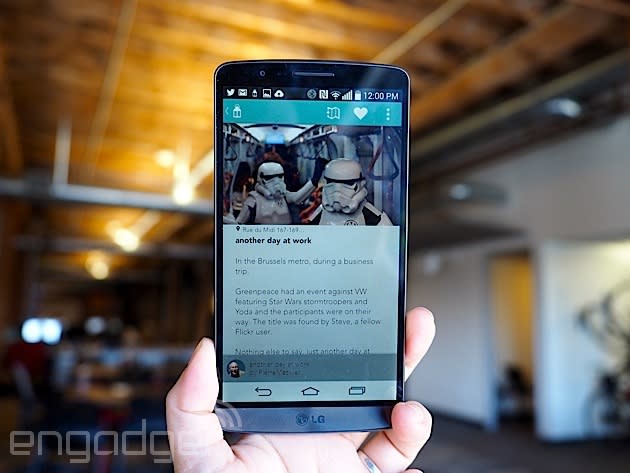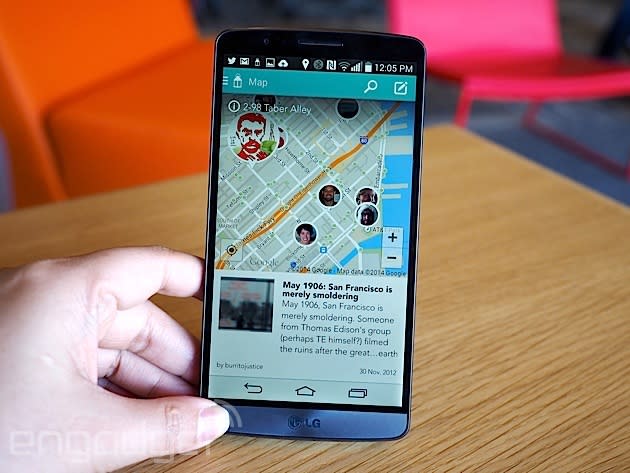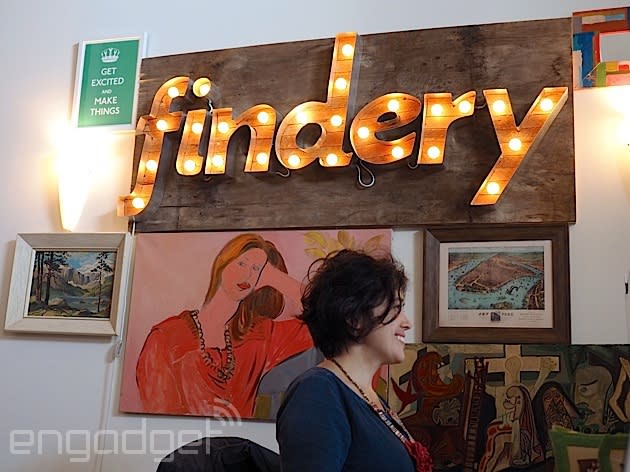Findery: the crowdsourced travel guide

"Find yourself on this map," Caterina Fake said enthusiastically. Fake, widely known as the co-founder of Flickr, had just greeted me into the Findery office, an airy loft tucked inside a nondescript building in the Hayes Valley district of San Francisco. Before I could take in the high ceilings and the afternoon light shining through a black pirate flag hanging from a railing, Fake directed my attention to what looked like a large, 16 x 20 framed portrait of a galaxy.
It was neither a galaxy, nor a map. Instead, it was a graphical depiction of what the Flickr community looked like in April 2005. Created by an avid Flickr user who goes by the name of GustavoG, the image showed hundreds of photo avatars linked to each other with blue lines indicating social connections. After pointing out where she was on the graph, I found my own Flickr avatar in just a few minutes. We were only a few connections away. "That cluster [the one my photo was in] represents all the early web people," Fake said, as if we were old friends.
It's been nearly six years since she left Yahoo-owned Flickr for greener pastures. A year later in 2009, she co-founded a startup called Hunch that promised to help users make better decisions based on a survey of their tastes and interests. Hunch eventually sold to eBay in 2011. Not one to stand still, Fake came up with yet another startup in 2012. She called it Pinwheel, but after a testy trademark dispute, it was renamed to Findery.

Findery, to put it simply, is an app that helps you find what's interesting around you, but not in the traditional way of restaurant recommendations or trendy nightspots. Instead, Findery is about uncovering hidden secrets and local knowledge, all of which is entirely sourced from Findery users themselves. So instead of using the app to locate the nearest sushi spot, you'd use it to find out the meaning behind an unusual statue or the history behind that run-down building down the street from your hotel.
In other words, don't mistake it for a Yelp or Foursquare competitor. "Discovery is not about ratings, reviews or restaurants. We want to be much more about discovery in the sense of discovering," said Fake. "We feel very strongly that the 'Where do we eat?' problem has been solved a thousand times and it's not very interesting. We very deliberately did not address that at all."
Instead, Findery is about people and stories. It's what Fake says has always mattered to longtime bloggers and those aforementioned "early web people" who were so crucial to Flickr's success. The tips on Findery are the type you'd expect from a real person, rather than a disembodied tour guide. It's much more personal, and therefore a lot more human. Fake describes Findery as somewhere in the continuum between Yelp and Wikipedia.

"We're very liberal arts," said Fake, invoking the famous Steve Jobs quote about the intersection of technology and liberal arts. "That intersection? We're there. We want to be the people's atlas."
To do all that, Findery needed a large database of user-generated content. That's the reason it was initially launched on the web -- its developers wanted to make sure there was enough content all over the world from real users before apps were rolled out. It was only this year that the company released them -- an iOS app debuted earlier this spring, while an Android one launched just last Thursday.
As I zoomed in and out of different parts of the Findery map, I noticed that some notes on the app tend toward the recommendation model ("This place has whiskey on tap!"), while others are more personal and unique. Fake showed me an intriguing photo of a crew setting up a fireworks display in Orlando, Florida. Underneath the photo was a note entitled "Monsters of Rock" that read: "On April 14th, 1979, Aerosmith, Blackfoot, Cheap Trick and Ted Nugent played at the Tangerine Bowl. I was on the fireworks crew and took this photo during setup." In the comments of that photo, the author recounted enjoying the show next to none other than Nugent himself.

"Isn't that cool?" asked Fake. It's this sort of personal story that adds flavor to a place, the kind of info you might not find in a Lonely Planet or a Zagat. Another example is a photo of a colorful sidewalk taken in Larreynaga, a small city in Nicaragua, on Good Friday. The note reads: "People spent hours creating art on the street with painted sawdust knowing that it would be destroyed by foot traffic later that day."
To surface the more interesting notes -- Findery gets its fair share of spam -- it uses an internal algorithm called "notability." Sort of like the "interestingness" metric on Flickr, Findery's algorithm figures out a note's importance based on a variety of factors, including if it's been blogged, if it's received a lot of clicks, if the user has a good reputation and so forth.
Notes aren't always short. I came across several that are paragraphs long, so much so they're practically essays about a particular building or place. Some were long and meaningful narratives, while others were pithy and humorous. I found one photo of a couple of Stormtroopers in the Brussels Metro in Belgium, apparently on their way to a Greenpeace protest. The note title was simply "another day at work."

It's this serendipity that prompted Fake to create Findery in the first place and, unsurprisingly, Foursquare was one of the inspirations. "One of the things that was so great about it was when you would get these unexpected social encounters in some remote neighborhood," said Fake, referring to Foursquare tips that would sometimes pop up on the phone. "You get this really lovely magic feeling of being time-shifted that you don't really get anymore ... It's been lost in the immediacy of the everyday."
While Findery doesn't see Yelp and Foursquare as competitors, it does have one in Field Trip, Google's point-of-interest app that does nearly the same thing. However, instead of relying on users to generate content, Field Trip uses information from guides like Thrillist, Zagat and local blogs. "I've always felt that it was really important for things to be written for the platform for which they are intended," said Fake, pointing out that seeing a Thrillist or Zagat post pop up when you're in a foreign locale can be a little jarring, while a more human note can feel more welcoming. Additionally, Field Trip doesn't have the personal voice that Findery has, which she sees as a real asset.
"We were being accused of being a hipster app," laughed Fake, remembering early reviews of the app. "Someone had opened it up in the Mission [San Francisco's current hipster haven] ... Well of course you'd see that!" But, she said, plenty of regular people from all over the world use Findery too.

Still, there remains a question of whether something as personal as this is what everyone wants. The popularity of Yelp and Foursquare attests to the generally accepted idea that people do want straightforward recommendations. Even Fake herself said that a lot of first-time users to Findery tend to review restaurants because people have just been trained to do that. But Fake believes that there's room for something different.
"I really rebel against this tunnel view of the Valley that we get here all the time -- sort of the Y-Combinator, young, urban male perspective on things," said Fake. Instead, she said the communities that Findery supports and attracts are different, and deliberately so. She pointed out that technology isn't just a Valley thing for the young and hip -- it's a global thing, for everyone. "I'm a 40-something mom. I'm not a typical demographic."
It's been a few days since the launch of Findery's Android app, and Fake tells us it's doing well.
"We feel that we're in a really good space, that we're forward-looking and not backward-looking," said Fake. She added, "Screens are multiplying and they're moving," referring to Google Glass and the recent interest in wearables. Fake said the team is definitely looking into making some kind of watch-compatible app, be it for Android Wear or Apple's WatchKit -- it's a natural fit for something like Findery.
"My absolute dream is to have Findery be on Virgin America," she said. "You could look out your window and be like, 'What's that? Tell me about where I am.' That's the dream."























